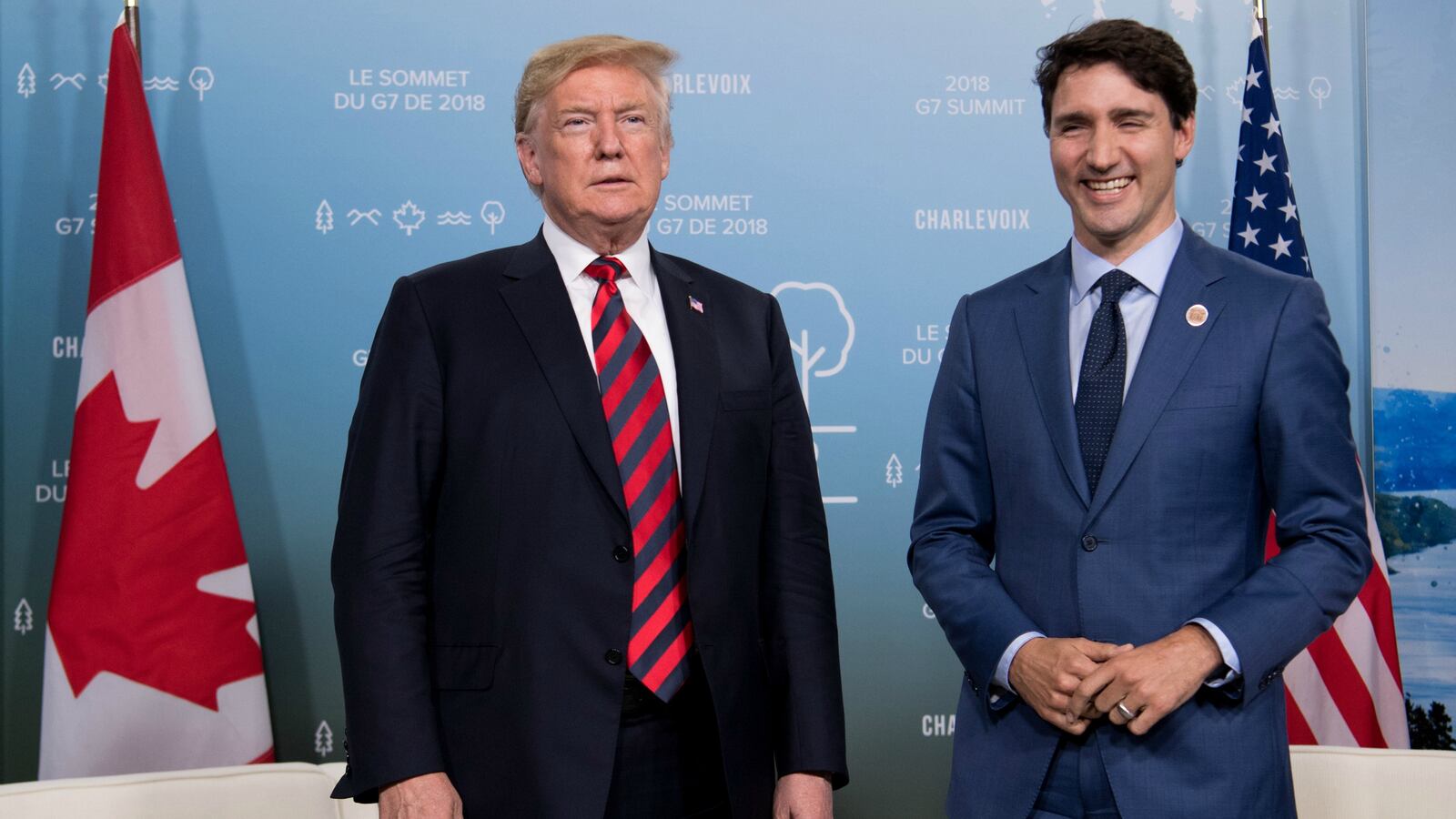President Donald Trump’s top economic and trade advisers on Sunday doubled down on the president’s attacks on Canadian Prime Minister Justin Trudeau, saying there’s a “special place in hell” for the “weak” and “dishonest” Canadian leader.
The name-calling underscores the growing rift between the U.S. and one of its closest allies over trade policies and tariffs, and it threatens to further upend the progress on key economic issues that world leaders say they made at the G7 summit over the weekend.
“There’s a special place in hell for any foreign leader that engages in bad faith diplomacy with President Donald J. Trump, and then tries to stab him in the back on the way out the door,” top White House trade adviser Peter Navarro said on Fox News Sunday, echoing the president’s similar attacks against Trudeau. “And that’s what bad-faith Justin Trudeau did with that stunt press conference. That’s what weak, dishonest Justin Trudeau did.”
Trudeau, whose country hosted the annual G7 summit, announced during the summit that Canada was preparing “retaliatory measures” against the Trump administration’s decision to impose new tariffs on steel and aluminum imports from his country.
“I have made it very clear to the president that it is not something we relish doing, but it is something that we absolutely will do, because Canadians—we’re polite, we’re reasonable, but we also will not be pushed around,” Trudeau said.
Larry Kudlow, the president’s top economic adviser, said the Canadian prime minister’s words amounted to a “betrayal” and a “sophomoric play” that makes the U.S. look weak ahead of the president’s summit later this week with North Korean leader Kim Jong Un in Singapore.
“The non-factual part of this was they have enormous tariffs. I mean, they have tariffs on certain dairy and food products of 290-295 percent. He was polarizing. Here’s the thing: he really kind of stabbed us in the back,” Kudlow said on CNN’s State of the Union.
Trudeau’s remarks set off a Twitter firestorm from the president, who called Trudeau “meek and mild” in a series of tweets Saturday night. The president also said the U.S. would not endorse the G7 communique, a statement negotiated by all partners at the summit, and threatened even more tariffs—this time, targeting automobile imports.
“PM Justin Trudeau of Canada acted so meek and mild during our G7 meetings only to give a news conference after I left saying that, ‘US Tariffs were kind of insulting’ and he ‘will not be pushed around.’ Very dishonest & weak. Our Tariffs are in response to his of 270% on dairy!” Trump wrote on Twitter.
Watch: pic.twitter.com/xFk1D3YrKy
— Pat Ward (@WardDPatrick) June 10, 2018
The president’s tweets spurred responses from some of his biggest critics when it comes to foreign affairs, including Sen. John McCain (R-AZ), the chairman of the Senate Armed Services Committee.
“To our allies: bipartisan majorities of Americans remain pro-free trade, pro-globalization & supportive of alliances based on 70 years of shared values,” McCain wrote on Twitter. “Americans stand with you, even if our president doesn’t.”
Later Sunday, European Council President Donald Tusk appeared to respond directly to Navarro’s comments, writing on Twitter: “There is a special place in heaven for @JustinTrudeau. Canada, thank you for the perfect organisation of G7!”
Despite the backlash, Navarro and Kudlow echoed the president’s initial statements, underscoring the deep divisions that could threaten to upend the U.S.-Canada relationship.
“To my friends in Canada, that was one of the worst political miscalculations of a Canadian leader in modern Canadian history. All Justin Trudeau had to do was take the win,” Navarro continued. “He did him a favor and he was even willing to sign that socialist communique—and what did Trudeau do? As soon as the plane took off from Canadian airspace, Trudeau stuck our president in the back. That will not stand.”
On Capitol Hill, Republican lawmakers—even the president’s staunchest allies—have warned the Trump administration that moving forward with the new tariffs will spark a trade war that the U.S. sure to lose. They’ve also accused Trump of misusing his authority to impose tariffs under Section 232 of the Trade Expansion Act of 1962, which allows the president to designate certain imports for tariffs if he feels that they threaten national security.
Sen. Bob Corker (R-TN), the chairman of the Senate Foreign Relations Committee, has been among the most vocal critics of Trump’s penchant to impose tariffs. He introduced legislation last week that would require Congress to sign off on any tariffs that the president wants to impose under Section 232.
“This whole thing feels like it’s getting out of hand to me. It feels like everything’s becoming transactional,” Corker told The Daily Beast recently.





